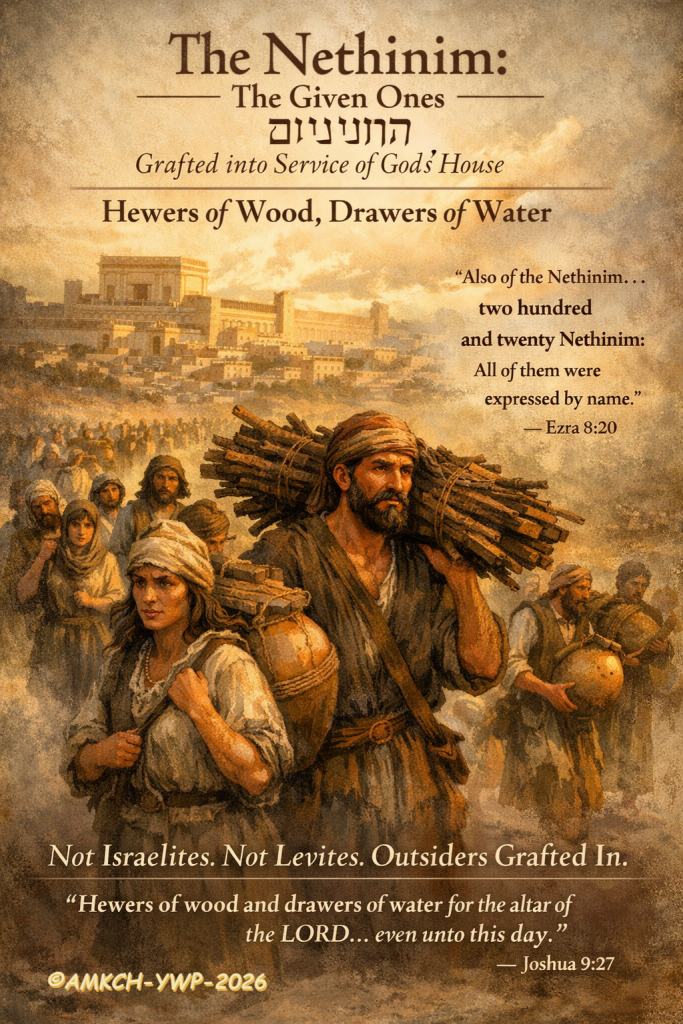
They weren’t priests. They weren’t slaves. They weren’t Levites. They weren’t even Israelites. They were the נְתִינִים, Nethinim, the given ones. Not given land, not given status, but given to service, to the hard, low, dusty work of God’s house. And still, when the call came to return to Zion, they came. Not one by one, but by the hundreds.
In Ezra 8:20, they are listed plainly, and yet with honor:
“Also of the Nethinim, whom David and the princes had appointed for the service of the Levites, two hundred and twenty Nethinim: all of them were expressed by name.”
The Hebrew behind the word “Nethinim” is הַנְּתִינִים, ha-Nethinim, from the root נָתַן, natan, meaning to give, to dedicate, to entrust. The text doesn’t say they were “born” Nethinim, it says they were appointed, assigned, given. This tells us something crucial about them. They were not a tribe. They were not native to the covenant. They were outsiders brought in, grafted into service, a shadow of the kind of Kingdom God always meant to build.
But their story starts far before Ezra. It starts in Joshua 9, when the Gibeonites, inhabitants of the land marked for judgment, feared the God of Israel and tricked their way into a covenant. They dressed in worn sandals, carried moldy bread, and pretended to be from a far-off land. When their ruse was uncovered, the leaders could not destroy them, because of the oath they had sworn in the name of YHWH. So instead, Joshua declared in Joshua 9:27:
“And Joshua made them hewers of wood and drawers of water for the congregation, and for the altar of the Lord, even unto this day, in the place which He should choose.”
In Hebrew: וַיִּתְּנֵם יְהוֹשֻׁעַ בַּיּוֹם הַהוּא חֹטְבֵי עֵצִים וְשֹׁאֲבֵי מַיִם “Joshua gave them…”, again, the same root: נָתַן– natan. He gave them. That is the beginning of the Nethinim.
They were Canaanites, under a curse, but preserved by covenant, spared from wrath and set aside for holy labor. Their very lives were a contradiction of judgment, grace through service. Their hands carried water and firewood, not swords. They came from trickery, but ended in humility.
Fast-forward to David’s reign, and we see the Nethinim again, this time, not just tolerated, but organized. According to Ezra 8:20, David and the שָׂרִים, sarim (princes, or chief officials) had appointed them for service under the Levites. Though Scripture doesn’t narrate when this happened, the verse confirms the structure: they were formal, trusted, and known by name. Not merely tolerated refugees anymore, but listed servants of the house of God.
Why does this matter?
Because when Ezra gathered the exiles by the river Ahava, as recorded in Ezra 8, he realized there were no Levites among the people. None. He stops the journey cold. He sends for Levites and Nethinim, because you cannot rebuild the house of God without servants. Without people willing to carry water and wood again. Without those who knew their task and stayed loyal to it.
The Nethinim were still there. After all these years, they had not scattered. They had not said, “We’ve done our time.” They had not traded temple service for comfort in Babylon. When the call came, they said yes. Two hundred and twenty of them. Named. Remembered.
Even in Nehemiah, when the wall was being rebuilt and the temple boundaries reestablished, it was the Nethinim who returned to live near the Temple Mount. Nehemiah 3:26 and 11:21 record that they lived in Ophel, just south of the temple. The Aramaic there says they were מִן־הַנְּתִינִים, min ha-Nethinim, servants of God’s house, still doing their duty. These weren’t priests, but they were faithful. These weren’t sons of Aaron, but they were keepers of the altar fires.
What kind of people are these?
They were not allowed into the inner sanctuary, yet they stayed near. They had no inheritance, yet they preserved the inheritance of others. They were never called clean, yet they never defiled the sacred. They were the overlooked, and yet God remembered them, by name.
That is why Ezra lists them. That is why their number is recorded. Not for glory. But for remembrance.
There’s a reason Paul, a trained Pharisee, later writes in Romans 9:25, quoting Hosea:
“I will call those who were not My people, ‘My people’…”
(Greek: καλέσω τὸν οὐ λαόν μου, λαόν μου)
The Nethinim were living prophecy. Outsiders made insiders through covenant and servanthood. They weren’t washed in blood like priests, but they were washed in faithfulness. They were Gibeonites, a people under wrath, but they were spared by mercy, and called to serve in a house not their own.
And doesn’t that sound exactly like what we were?
Not priests, not Levites, not of the line of Aaron or Judah. But called. Given. Appointed. Servants of the altar. Drawers of water for others. Hewers of wood for the fire of God.
There are Nethinim in every generation, people whose names never appear in the scrolls of leadership but are written in the records of heaven. They don’t teach, but they serve. They don’t hold the ark, but they keep the lamps lit. They don’t sound the trumpets, but they sweep the courts.
And when God says, “Who will go up with Me to Zion?”, they pack their bags. Quietly. Without applause. They go.
So don’t forget them. The ones who weren’t chosen by bloodline, but became chosen by faithfulness.
And if the Lord has appointed you to be one of the given ones, wear it like a crown. Because the Nethinim were not born into glory. But they were named.
And that, in God’s house, means everything.
If you liked this message, please leave a positive comment. I would love to hear from you!
image done by my chatgpt at my direction. If any of these people looks like you or someone you know, that is purely coincidental. They are not.
©️AMKCH-YWP-2026